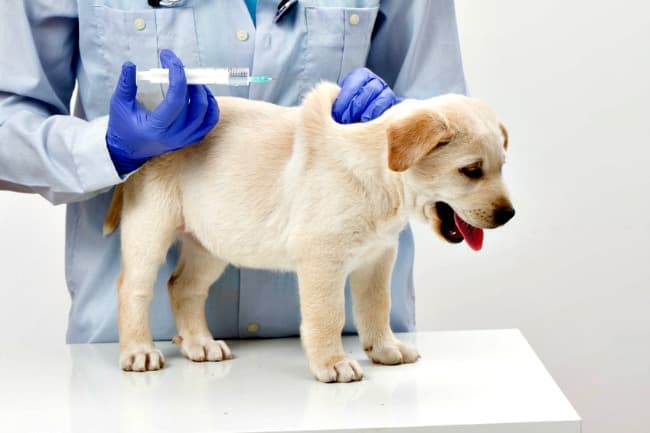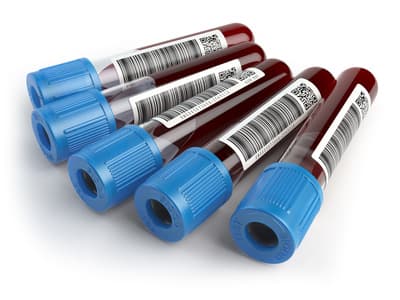Puppy Shots - Pros & Cons
Puppy shots are part of the routine veterinary care all puppies receive during their first few months of life.
These shots can protect your puppy from some dangerous and contagious diseases (such as Parvo and Distemper) but the risks associated with over-vaccination are real.
The current AAHA (American Animal Hospital Association) recommended puppy vaccination schedule calls for:
- Puppies to be vaccinated with four CORE vaccines (often combining at least three of them in one vaccine)
- Puppies to be vaccinated at least three times, at two or three week intervals
Research is beginning to show that this practice increases the chances of side-effects (ranging from mild to severe) in puppies AND decreases the effectiveness of the vaccines.
So... what can you, a responsible and worried puppy owner who simply wants to protect his/her pup, do to make sure that your furbaby gets the protection he needs while minimizing the risks involved?
This article has the info. you need to choose the approach you feel most comfortable with.

Vaccination can sometimes be seen as 'all-or-nothing', with Pro-Vaxxers and Anti-Vaxxers at opposite ends of the spectrum.
I am neither 'Pro-Vaccine' nor 'Anti-Vaccine'.... but I am pro-informed-choice.
There's a fair amount of research, statistics and in-depth investigation info. on this page.
If you enjoy statistics, research and like to see the 'big picture', these are for you!
- Puppy Shots - The Big Picture
- Vaccines & Disease Prevention
- Titer Testing
- Adverse Reactions
- Is there an Alternative?
If you simply want basic puppy vaccination info., tips on minimizing risks, and the current AAHA recommendations, CLICK HERE to jump straight to that section.
Puppy Shots - The Big Picture
Puppy shots are safe and effective right?
The answer to this is question is 'yes'.... and 'no'.
It's true that puppy vaccinations can protect your little Rascal from contracting certain illnesses, and in my opinion it's safest to make sure that your pup is vaccinated against the most dangerous ones (these are Canine Parvovirus and Distemper).
However, the current protocol for puppy immunization uses a 'scatter-gun' approach which results in puppies being vaccinated several times, increasing the risk of side effects and (strange but true) reducing the effectiveness of the vaccines.
Maternal Antibodies & Vaccination
A mother dog passes her antibodies against infectious disease onto her puppies through the colostrum and milk that they receive when nursing.

These are called MDA (Maternally Derived Antibodies) and for the first several months of life they provide 'passive immunity', meaning they protect little Rascal from disease while his own immune system is developing and maturing.
However certain levels of MDA in a puppy's bloodstream interferes with vaccination, basically cancelling-out the shots and making them ineffective.
Currently most veterinarians recommend that puppies be vaccinated with a combination vaccine three times, at three week intervals, starting at around 6 and 8 weeks of age.
This is because they hope to hit the short window of time when MDA levels are low enough for the vaccine/s to be effective, and the puppy is young enough to have been protected from disease exposure.
Little Rascal then gets injected with both the viruses and the adjuvants (ingredients added to vaccines for preservation, stability and to enhance effectiveness) multiple times.
This stresses his developing immune system which can cause short-term and long-term side-effects ranging from mild to life-threatening.
It also leads to chronic health problems and auto-immune disease.
Interestingly, scientific research doesn't support this approach.
A study performed by vaccine manufacturer Vanguard using a COMBINATION vaccine (one which contains several different vaccines) tested the efficiency of the vaccine in stimulating antibodies in an immune response.
This is what they found:
- When vaccinated at 6 weeks old, 52% of puppies showed an adequate immune response
- When vaccinated at 9 weeks old, 88% of puppies showed an adequate immune response
- When vaccinated at 12 weeks old, 100% of puppies showed an adequate immune response
According to the World Small Animal Veterinary Association (WSVA) Vaccination Guidelines, individual puppies may absorb more, or less, of the antibodies from colostrum than their siblings.
This could result in one puppy responding to vaccination earlier/later than another... even in the same litter. It's not an exact science. Yet.
And that's not all.
Researchers at Purdue University, Indiana, found that the risk of side effects associated increased dramatically with each round of vaccinations:
- For smaller dogs, under 22lbs, the risk of adverse vaccine reactions increased by 27% each time
- For medium to large dogs, over 22lbs, the risk showed a 12% increase.
Yup, there's more.
In 1996, Pfizer Pharmaceutical Company performed a study to measure the immune response of puppies to a SINGLE vaccine.
The puppies were divided into two groups.
One group were vaccinated twice, once between 8 and 10 weeks of age, and once at 12 weeks.
The second group was vaccinated once, at 12 weeks of age.
After the 12 weeks shots, both groups were tested for antibody levels and immune response.
Guess which group responded better? Yes, the puppies who were vaccinated just once!
The results of the study showed:
- 98% of the puppies vaccinated twice showed adequate immune response
- 100% of the puppies vaccinated once showed an adequate immune response
Maternal Antibodies and Combination Vaccines
Combination puppy shots normally protect against between two and seven different diseases.
In a puppy's bloodstream, the levels of maternal antibodies to each individual disease drop gradually, they also drop at different rates.
Distemper antibodies are often at a low enough level for vaccination to be effective at around 8 or 9 weeks of age.
Parvovirus antibodies remain at higher levels for considerably longer, so at 8 or 9 weeks a Combo vaccine isn't likely to be effective.
This means that for a combination vaccine to work properly it needs to be given at an age when all MDA levels have dropped to a low enough level.
Although no one knows for sure at exactly what age this happens, research shows that by 16 weeks combination shots are extremely effective at producing an adequate immune response to the diseases targeted by the AAHA's core vaccines.
All of this is summed up by the following quote given by Dr Ronald Schultz (a veterinary immunologist) after he spent 40 years testing canine vaccination and immunity...
"Only one dose of the modified-live canine CORE vaccine, when administered at 16 weeks or older, will provide long lasting (many years to a lifetime) immunity in a very high percentage of animals."
Take-Away Points....
- Maternal antibodies protect your puppy from disease for several months after birth
- Puppy shots given after 16 weeks of age can give your puppy complete protection
- Vaccinating puppies repeatedly increases the risk of side effects and health problems
- Vaccinating puppies more than once decreases the effectiveness of their immune response
Puppy Shots - Disease Prevention
There are puppy vaccines available for several dog illnesses including:
- Canine Parvovirus
- Distemper
- Adenovirus
- Parainfluenza
- Coronavirus
- Bordatella
- Leptospirosis
- Rabies
Some of these are highly contagious and very dangerous diseases, specifically Parvovirus and Distemper.
Less serious, and generally self-limiting diseases (ie they resolve themselves) include Bordatella and Parainfluenza.
Adenovirus can also be a fairly mild disease in adult dogs, but is potentially more dangerous and life threatening in puppies.
Coronavirus is another self-limiting disease, and is most often seen in very young puppies (usually before they're old enough to be vaccinated anyway).
Leptospirosis symptoms can be so mile as to be non-existent, or severe, or anywhere in between.
It is most often transmitted by wild animals and from contaminated water.
If you live in a hot, humid state, especially if you're in a rural area or your puppy is going to be hunting or working in woodland or water, this vaccination MAY be important.

Which Puppy Shots Does Your Rascal Need?
The vaccinations your puppy needs could be different from the vaccinations someone else's puppy needs.
Unfortunately vaccine manufacturers haven't (yet) made it possible for us to pick and choose the individual shots we would like our puppies to have.
Single Parvovirus vaccines are available (ie they ONLY contain parvovirus), but Distemper is only available when combined with other core vaccines, such as Parvo and Adenovirus.
Research has shown that side effects and adverse reactions are more common, and more severe, when vaccines against several diseases are given at the same time, so it makes sense to minimize this as much as possible.
Each veterinary clinic will have specific vaccine combinations that they prefer to use, so it's important to discuss this with your vet to find a solution that works for you.
Kennel Cough is a fairly minor illness, but it can cause a cough and upper respiratory symptoms for a fairly long time. It's also HIGHLY contagious.
Because of how easily it spreads, if your puppy is going to be attending doggie daycare or be boarded while you take vacations, these establishments will almost certainly want little Rascal to have had the Bordatella vaccine.
The Rabies vaccine is only given once, usually at 16 weeks, and then annual boosters are required (by law in most states).
In the majority of US states, initial Rabies vaccination is required by law (or by Government/State policy), and so are adult dog booster shots. It's the only vaccine that is mandated in this way.
In some states there is allowance for dogs to be exempt if they have been injured by a previous Rabies vaccine, or had a severe adverse reaction.
You can check to see what the regulations are for your state here Rabies State Law
AAHA Puppy Vaccination Recommendations
The AAHA recommends vaccinating puppies against four specific diseases.
These are the 'Core' vaccines:
- Parvovirus
- Distemper
- Adenovirus
- Parainfluenza
They also recommend that these vaccinations be given at least three times before the puppy reaches 16 weeks of age.
The Rabies vaccine is mandatory, generally at 16 weeks.
'Average' Veterinary Puppy Shots Schedule
There is no specific, single puppy shots schedule that every veterinarian follows. Each vet, and each practice will have their own approach but it will usually follow these general guidelines...
Core Vaccines:
The combination vaccine for Parvovirus, Distemper, Parainfluenza and Adenovirus is given three times, at three week intervals.
- First dose between 7 and 9 weeks
- Second dose between 10 and 12 weeks
- Third dose between 13 and 15 weeks
The Rabies vaccine is given just once, usually at around 16 weeks.
It should not be given before your puppy is 12 weeks old.
Optional Vaccines:
The Bordatella vaccine for kennel cough is an intra-nasal (not an injection, it's put up your puppy's nose) and is usually given once, somewhere between 8 and 16 weeks.
Leptospirosis vaccination is given twice, once between 8 and 9 weeks of age, and once between 11 and 12 weeks of age.
Giardia vaccination is given twice, once at 14 weeks and again at 17 weeks.
The vaccine for Lyme Disease is also given twice, once at 14 weeks and again at 17 weeks.
The AAHA no longer recommends the Coronavirus vaccine as it is 'a mild or sub-clinical disease, generally occurs in puppies less than 6 weeks old and is typically self-limiting.'
The most recent veterinary recommendations from the AAHA acknowledges that giving numerous vaccines simultaneously can be dangerous and is not advisable:
'Administration of multiple doses of parenteral vaccine at the same appointment, particularly among small breed dogs (<10kg), may increase the risk of an acute-onset adverse reaction.
Alternative vaccination schedules may be indicated, eg. delaying administration of a non-core vaccine by 2 weeks following administration of core vaccines.'
For the first time, information on Titer testing (measuring the level of disease antibodies in the bloodstream) is included in the AAHA's recommendations.
You'll also find detailed information on the recognized side effects and adverse reactions to canine vaccines.
Titer Testing & Puppy Shots
Titer testing is the process of measuring the antibody levels to certain diseases in the bloodstream.
High enough titer levels mean that the puppy/dog is immune to the disease being tested for.
In adult dogs you can test the titer levels and if they're high enough it shows that booster shots aren't necessary.
It's a great way of reducing the number of vaccinations he gets over a lifetime, while keeping him safe.
You can use titer testing to protect your puppy and reduce the number of puppy shots he gets.

The best, safest and most accurate protocol for puppy shots is to have your puppy given the core vaccinations between 14 and 16 weeks and then test his titer levels 3 weeks later.
Most likely he will show immunity to all diseases vaccinated against. If that happens you're home free :)
If there is one which doesn't reach the acceptable antibody level you can then choose to vaccinate again for that specific disease (it is likely to be one that has a single vaccine option as the Distemper vaccine usually 'takes' fairly early).
Research conducted by Dr Schultz's show that this immunity lasts a MINIMUM of 7 years for Rabies and Parvovirus, 9 years for Adenovirus and 15 years for Distemper.
The AAHA Guidelines are periodically updated, and over the past decade or so have swung back and forth in terms of recommendations for puppy shots and booster vaccinations.
In 2011 their guidelines stated:
'Among healthy dogs, all commercially available core vaccines are expected to induce a sustained protective immune response lasting at least 5 years thereafter.'
According to the same guidelines annual boosters are no longer the default for canine vaccinations.
Although your little Rascal is a puppy now, he will grow into an adult dog, and booster vaccinations are a subject you will need to approach with the same care and concern that you do his puppy shots.
Statistics show that approx. 60% of veterinarian's vaccinate more often than the AAHA's guidelines' recommendations (which are still heavily weighted towards over-vaccination).
Titer testing is one of the tools you can use to protect your dog from disease and from over-vaccination.
Not all veterinary practices offer titer testing, or have any significant knowledge of the process.
I'd suggest calling veterinarians in your area ahead of time and finding one who is familiar with titer testing. Also, check for pricing.
Some vets charge several hundred dollars to send a sample of your puppy/dog's blood for testing.
There is a more cost-effective way for you to do this, all you need is a blood sample from your puppy.
All you have to do is follow the simple instructions here on Dr Robb's Protectthepets.com Titer Draw page.
The blood draw should cost somewhere around $50, often less, and Dr Robb's titer test currently charges $45 for CORE vaccine titers, $50 for Rabies, or $75 for both.
Protectthepets was founded by Connecticut veterinarian Dr John Robb DMV who has been fighting the established protocol for dog vaccinations for years, because he believes it to be unsafe.
Learn all about Dr Robb's quest to protect pets from the dangers of over-vaccination here... Protectthepets.com
Hemopet laboratories also offer titer testing services (by USPS, FedEx or UPS, no refrigeration required!) and you can request this using the Hemopet.org online submission form.
Hemopet's pricing is currently a bit higher than Dr Robbs at $98 for Rabies and $52 for Distemper & Parvo. Find out more here... Hemopet Veterinary Diagnostic Laboratory
Or, you can let your vet know about two companies ( VacciCheck and TiterCheck) that offer in-house titer testing kits which veterinary clinics can order/use on their own premises. Both offer results within 30 minutes and on average cost less than $100 per test.
This is what the WSVA (World Small Animal Veterinary Association) has to say about titer testing:
'While antibody testing can still be relatively expensive, the principles of evidence-based veterinary medicine, suggest that titer testing for antibody status (for either puppies or adult dogs) should be better practice than simply administering a vaccine booster on the basis that this would be safe and cost less'.
Straight from the horses-mouth!
Veterinarian's should be up to speed with the research and recommendations of veterinary organizations, but sometimes they aren't... or financial or other concerns get in the way of their following the guidelines.
Finding a vet who is willing and able to accommodate titer testing and minimal vaccinations (as required according to immunity levels) is the best and safest route that you can take for Rascal, now and in the future.
Rabies Vaccination:
Rabies titer testing can ONLY be done in certain, approved laboratories and even a test result that indicates immunity doesn't over-ride national and regional laws/regulations for vaccination. It is the one disease where boosters are mandatory every one to three years depending on the vaccine used and the laws in place.
Adverse Puppy Shots Reactions
Many puppies have a reaction to getting their vaccinations.
Sometimes puppy shots reactions are fairly minor side-effects such as swelling or a 'knot' forming at the site of the injection.
Other times they can be as severe as an anaphylactic allergic reaction which can be fatal.
There are many adverse reactions to vaccination which aren't immediately visible, they may show up months, or even years later.
These include chronic disease, auto-immune conditions, cancers, behavioral issues, allergies and more.

Purebred puppies (and adult dogs) of certain breeds can be at a higher risk of having a bad reaction to their shots.
This is a genetic weakness, believed to be caused by the relatively small gene pool that was necessary to breed for specific characteristics (both physical and mental).
Some breeds are also at a higher risk of contracting certain diseases due to genetic weaknesses caused by the same problem (Rottweilers and Parvo are a prime example of this).
Certain small dog breeds are slightly more at risk of having an adverse reaction to vaccination than larger dogs, but no breed/size/individual is immune to the risks involved.
Some vaccines are considered higher-risk than others in terms of the likelihood of them causing reactions/side effects, but no vaccine is risk-free.
Puppy Vaccinations - Is There an Alternative?
Actually there is. Homeopathic remedies called Nosodes can be used in place of mainstream vaccination.
Nosodes can be used either to treat disease, or to prevent it. There are no scary side-effects like those seen with standard puppy shots.
However, using nosodes as an alternative to vaccination is a fairly new 'science' and does not have a huge volume of statistics behind it.
Although many holistic/homeopathic veterinarians currently use nosodes instead of vaccinations because of their preventative qualities and safety, the jury is still out when it on the efficiency of this protocol.
Nosode therapy should be given by a homeopathic/holistic veterinarian, at least to begin with.
To find a holistic vet in your area you can check out VetFinder on the American Holistic Veterinary Medical Association website.
You can also visit a list of holistic practitioners who have passed Dr. Richard Pitcairn's Professional Course in Veterinary Homeopathy Training Course on his Referrals Page.
Puppy Shots - Summing it all Up!
As I said at the start of this monster article, there is a LOT of information here.
Puppy vaccination is an important topic and in terms of both veterinary regulations and public opinion significant changes are coming.
We now have the research to support the belief that over-vaccination is dangerous for our pets (as it is for ourselves) and the ability to do better in terms of protecting them.
Whether you choose to follow current vaccine recommendations, opt for minimal optimally-timed vaccines and titer testing, or take a holistic approach with nosodes is entirely your choice (with the exception of Rabies vaccination).
We all want to do what's best for our precious little Rascals, and have to follow our what our hearts and minds tell us.
Regardless of the route you take, making sure your pup gets what he needs to keep his immune system in tip-top shape will help protect him from disease and keep him healthy and happy for many, many years to come.
You Might Also Like:
- Home
- Puppy Vaccination



